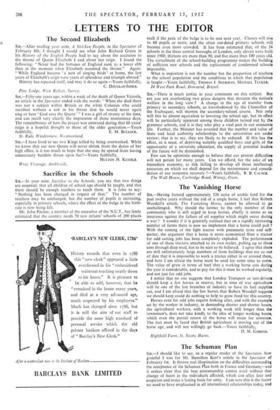The Vanishing Horse
SIR,—Having farmed approximately 230 acres of arable land for the past twelve years without the aid of a single horse, 1 feel that Robert Woodall's article, The Vanishing Horse, cannot be allowed to go unchallenged. Why should the farmer be the only member of the community who is still urged to keep horses, chiefly it seems as an insurance against the failure of oil supplies which might occur during a war ? I wonder if it is generally realised that on a rapidly increasing number of farms there is now no implement that a horse could pull ? With the coming of the light tractor with pneumatic tyres and self- starter, the argument that a horse is more economical than a tractor for odd carting jobs has been completely exploded. The performance of one of these tractors attached to its awn trailer, pulling up to three tons through deep mud, has to be seen to be believed. 1 agree that there are still unfortunately large numbers of farm buildings that are so out of date that it is impossible to work a tractor either in or around them, and here I am afraid the horse must be used for some time to come. The value of grass in terms of beef that a working horse eats during the year is considerable, and to pay for this it must be worked regularly, and not just for odd jobs.
I notice that no one suggests that London Transport or taxi-drivers should keep a few horses in reserve, but in time of war agriculture will be one of the last branches of industry to have its fuel supplies cut, and I am afraid that the few horses that Robert Woodall suggests we should keep could do nothing to help to grow food for this country.
Horses even for odd jobs require looking after, and with the example set by the worker in industry, in demanding shorter and shorter hours, the agricultural workers, with a working week still longer than the townsman's, does not take kindly to the idea of longer working hours, which even the partial return of the horse will mean for someone. The fact must be faced that British agriculture is moving out of the horse age, and will not willingly go back.—Yours faithfully,


























 Previous page
Previous page